Hello.
It is surprising that in Russia they have been threatening to block YouTube for several years, with such proposals coming from officials and deputies. Billions of fines are imposed on the Russian legal entity Google, at the moment their amount has exceeded 30 billion rubles. Google is trying to go through bankruptcy proceedings and de facto has no presence in Russia. Nevertheless, the YouTube issue remains extremely painful for politicians and causes a sharp reaction.
In order not to repeat what has already been said, I refer you to a detailed analysis of how Google caching servers work in Russia, what their shutdown means, and also why YouTube is not blocked in Russia. My opinion on these issues has not changed in any way.
Let me remind you that YouTube is huge in Russia, it is the largest resource with a monthly audience of 96.1 million people. And no politician in their right mind is ready to block YouTube, as this will cause serious social tension.
But it was Alexander Khinshtein who blew up the media field. The Chairman of the Committee on Information Policy, Information Technology and Communications of the State Duma spoke on his TG channel.
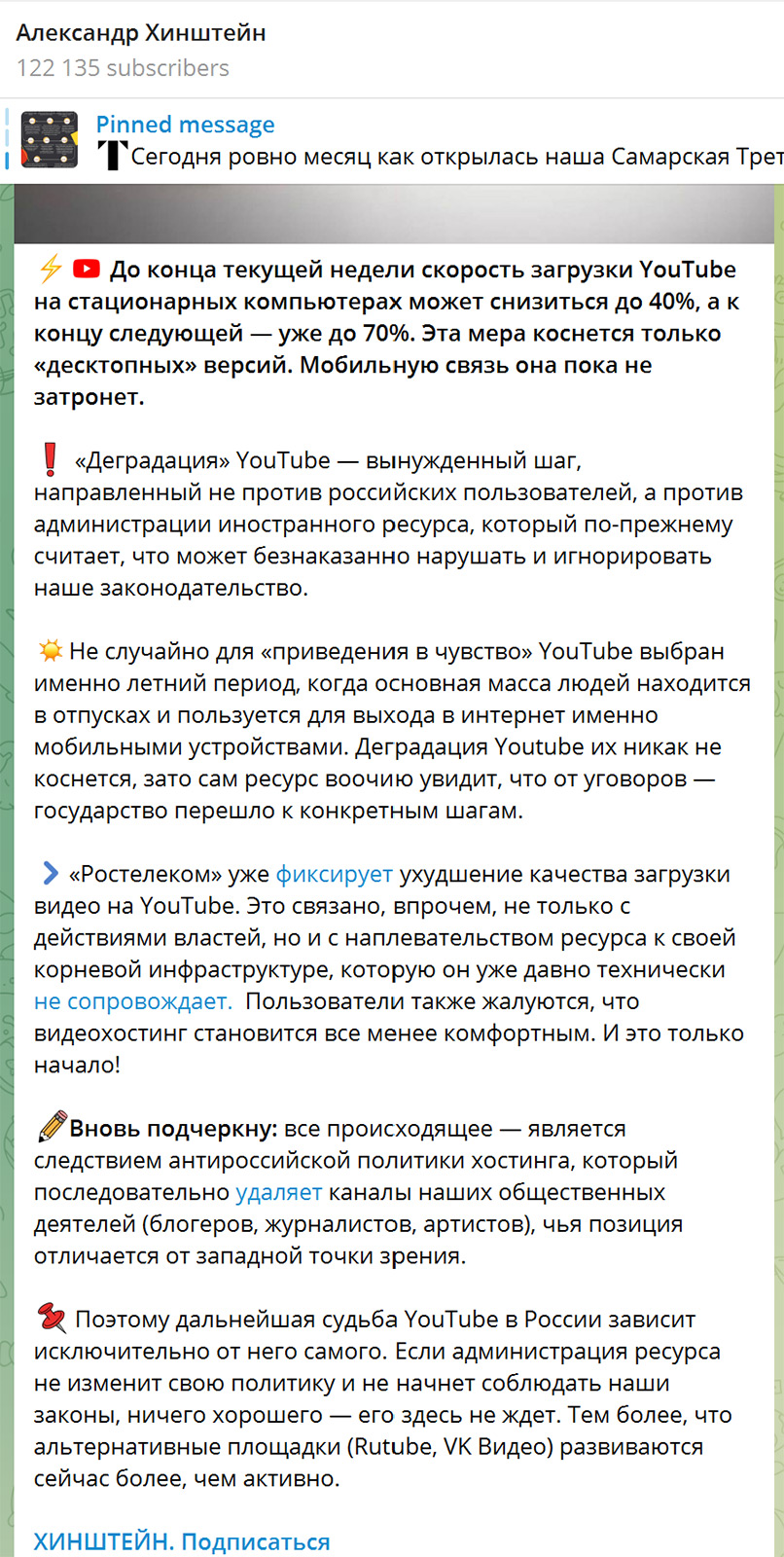
It is important to analyze the initial message, as it has received maximum discussion in society and various media. I will highlight several key messages:
- By the end of the week, YouTube speed on desktop computers may decrease by 40%, by the end of next week – up to 70%. Mobile Internet will not see such restrictions;
- The “degradation” of YouTube is a forced step to bring the hosting administration to its senses, that is, these are the actions of Russian officials.
You can find the original recording right here.
A sensational statement in every sense, made for the first time. A State Duma deputy dealing with internet issues publicly announces that Russia is beginning to limit the speed of access to YouTube. Articles about this have appeared in many foreign publications, including Reuters. Maximum coverage and citation.
True, a day later Alexander Khinshtein came out with a refutation of his own words, he disavowed what he had said earlier and began to claim that there was no blocking of YouTube by the authorities, and the drop in speed was due to Google’s inaction and the company itself was to blame for everything. You can find this message right here.
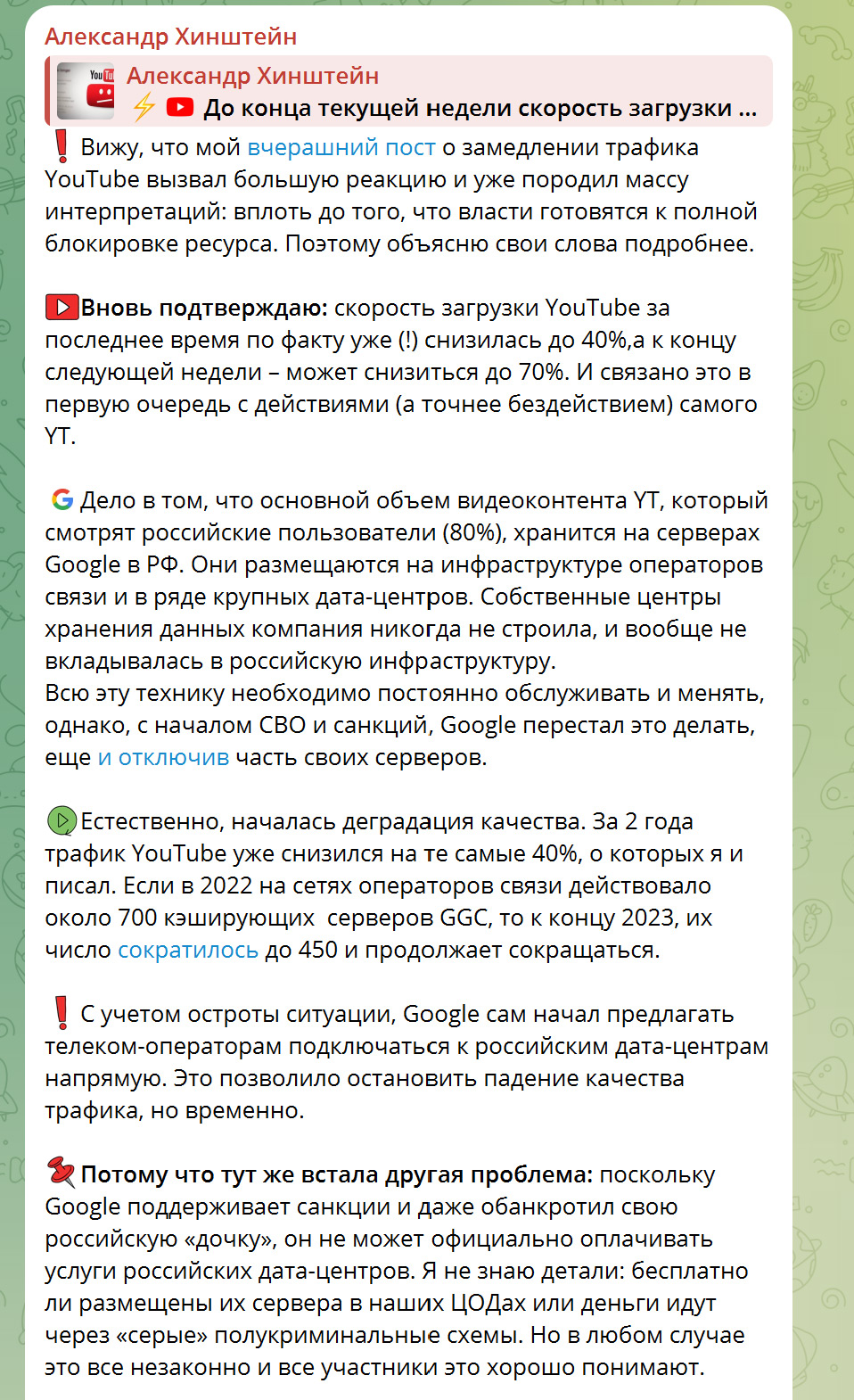
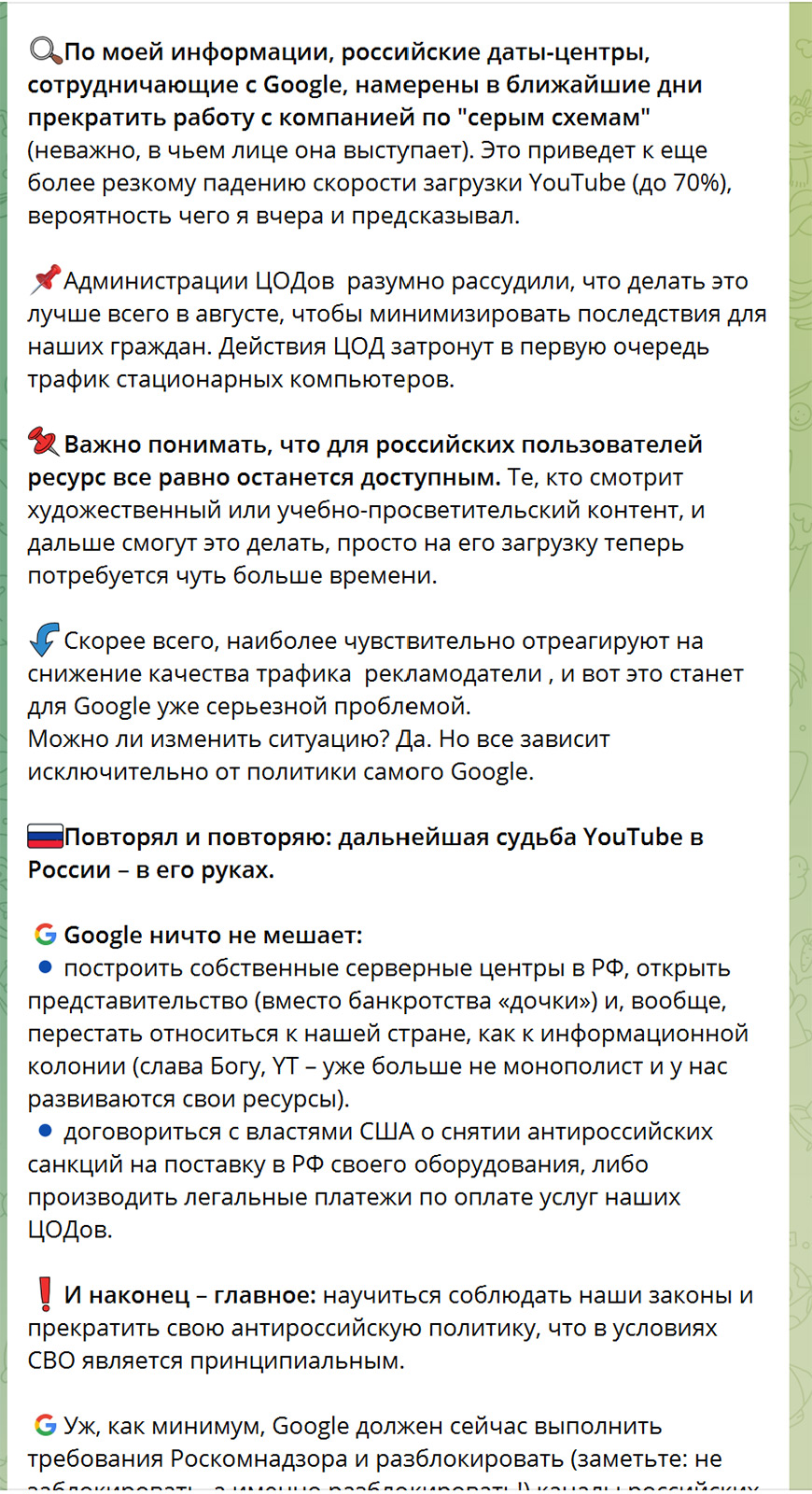
Of note, what is important to us: “It is important to understand that the resource will still remain accessible to Russian users. Those who watch artistic or educational content will continue to be able to do so, it will just take a little longer to load.”
Alexander Khinshtein knows how to express his thoughts perfectly, he does it vividly and can defeat many opponents in a conversation. But in this case, all the statements look emotional, with no logic. I wonder, if there are no YouTube blocks, then why can’t you watch any content that is on the platform? What’s the problem? There are no problems, you can watch anything.
Khinshtein’s speech creates a conspiracy theory, essentially accusing the Russian authorities of actually blocking YouTube, but simply not wanting to admit it and blaming the lack of Google infrastructure inside Russia. And they themselves slow down YouTube, have their own plans for this, and so on down the list. I still don’t believe that Russia has a plan to block YouTube, since it is suicidal for any politician, Khinshtein’s quick retraction of his own words illustrates this well.
We conducted a survey to find out whether our readers have noticed YouTube slowdown on their home internet, you can find it here here.

A small part of readers have experienced such a slow speed that they cannot use YouTube, most have not noticed any changes. For example, I have no noticeable changes on my home Internet, any videos are played in any resolution (provider MTS).
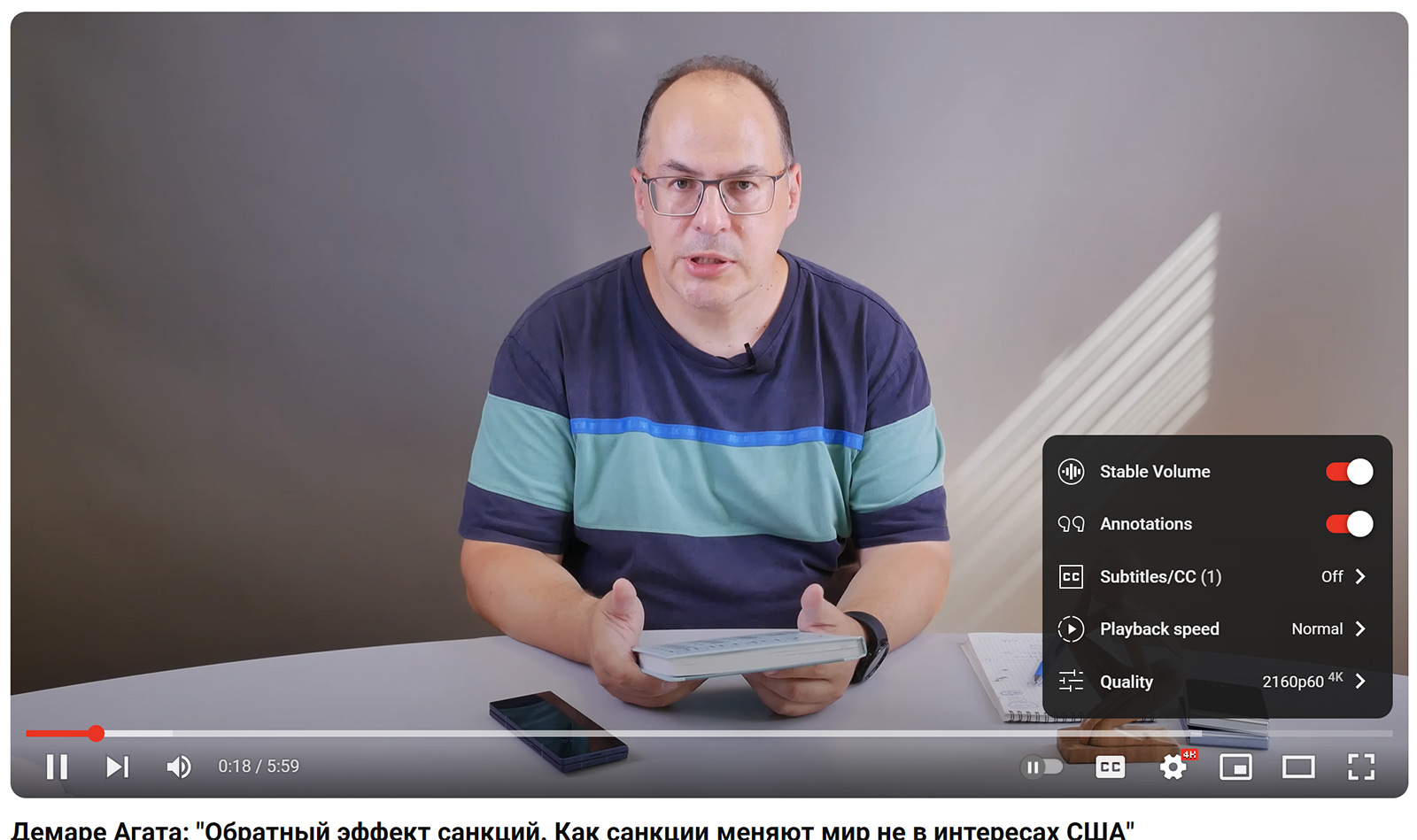
I tried poking around with my friends, almost everyone has YouTube working in the usual manner on different providers, no critical speed drop was noticed. At the same time, my colleagues have situations when the service works through a stump-deck, but starts to quickly load videos through a VPN connection. All together, this indicates the absence of mass blocking of the service, this can be judged by analogy with those social networks that are under complete blocking or slowdown. If the state turned on similar mechanisms, we would see problems for YouTube, but nothing like that is observed.
Why Blocking YouTube Is a Bad Idea, Another Example
I commented on Alexander Khinshtein’s statements in dozens of different media outlets and found, as I see it, the right analogy. If we have a huge library that contains books from all over the world, and these books contain a lot of useful and necessary information, then you will try to maintain access to it. Even if the library contains 5% of books that can be safely called vile, denying human values, and so on down the list. And, even more so, you will not try to destroy the library and access to it just because of this percentage of bad books. This looks like a stupid decision, to say the least. And here is exactly the same situation with YouTube, there is more useful stuff there than bad. And the service can push certain videos to the point of stupefaction, the question is in the person himself, whether he will watch them or not. Will he believe what they are trying to put into his head, or not. To assume that one viewing of some foreign agent will turn a person into the opposition is simply ridiculous. Moreover, in Russia any prohibitions are perceived exactly the opposite, if they prohibit, it means that they are telling the truth. And why is this necessary?
But there is another point that is more important here, it is purely technical in nature. People will not stop watching YouTube, in Russia today the penetration and use of VPN clients is one of the highest in the world.
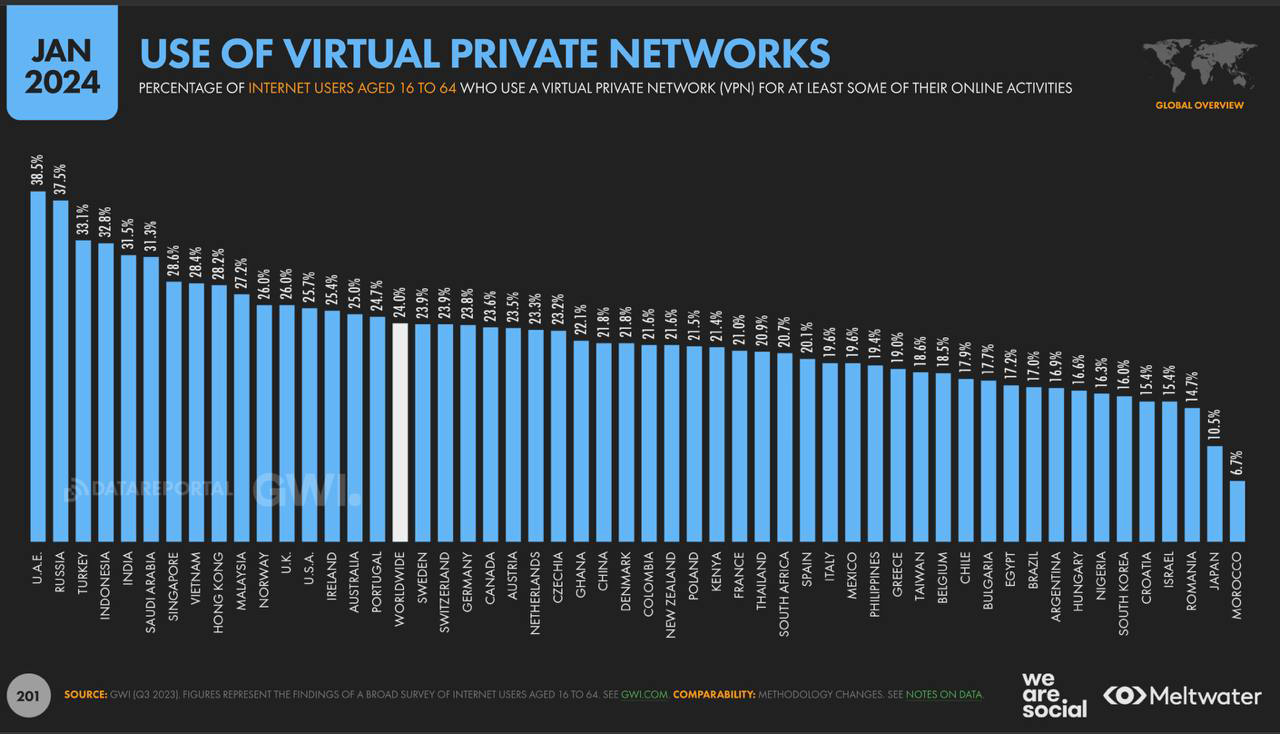
During the Black Friday broadcast on Sputnik radio, where we discussed exactly the same topic, a Rostelecom support employee called us and said that when YouTube is hacked, Internet users contact them and the support actually helps install VPN clients. It turns out that providers cannot refuse YouTube, since it is one of the key services for their clients, and if they cannot provide high-quality access to it, then they have to figure out how to get around the problems. Bravo! I think this reflects all this fuss around YouTube and its potential blocking. At the moment, RuNet has a number of blockings that break various services, and quite legal ones. It gets funny when an operator blocks its own site, from its own network! By mistake, but nevertheless, it looks funny.
An attempt to block YouTube will lead to an increase in traffic, and foreign traffic at that. The service will not disappear, but providers will receive additional expenses, which will worsen their economy. Ultimately, this will lead to an increase in the cost of the service, forcing prices to rise within the country. And this is clearly not what officials want, in any case, everything points to the exact opposite.
How to Fix YouTube Problems
If for some reason YouTube has stopped working properly, you just need to turn on a VPN, and everything will instantly change. I think this advice is so obvious that it does not need to be repeated. In the Chrome browser, you can enable support for the Quic protocol. For some, this helps get rid of the lack of speed, for others it does not. But in general, there are no problems with YouTube that cannot be solved in five minutes and get access to the content that you like and need in everyday life.
There are no blockings of the service in Russia, and there are no bans either. Therefore, you can use the service calmly and without unnecessary headaches. The Kremlin has repeatedly and officially stated that blocking YouTube is not being considered. Alexander Khinshtein’s initial statement can be attributed to a desire to attract additional attention without regard for the fact that the state has made a different decision and is adhering to it. I would like consistency in all branches of power, both legislative and executive, and not such contradictory statements, because someone might believe them.
Source: mobile-review.com


